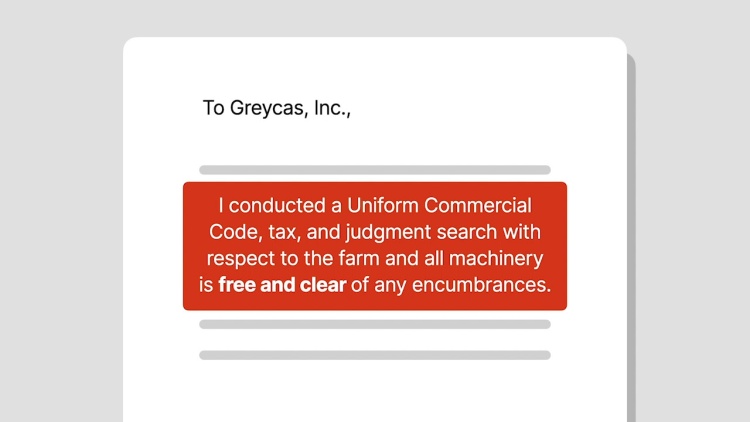Greycas, Inc. v. Proud
United States Court of Appeals for the Seventh Circuit
826 F.2d 1560 (1987)
- Written by Craig Conway, LLM
Facts
Wayne Crawford, a nonpracticing attorney, managed a large multimillion-dollar farm that had fallen into dire financial troubles. In an effort to save the farm from bankruptcy, Crawford sought a loan from Greycas, Inc. (plaintiff), an Arizona financial company. Greycas agreed to loan Crawford over $1.3 million to be secured by the farm’s machinery, but it was unaware that Crawford had previously pledged the machinery to other lenders. Greycas required Crawford to submit a letter from an attorney assuring Greycas that there were no prior liens on the machinery that was to be used to secure the loan. Crawford engaged his brother-in-law Theodore S. Proud, Jr. (defendant), an attorney in private practice in a Chicago, Illinois, suburb, to write the letter. In the letter, Proud wrote that he had conducted a Uniform Commercial Code tax and judgment search to ensure that the machinery was free of other liens. Proud had never conducted the search. The following year, Crawford defaulted on the Greycas loan and subsequently committed suicide. Greycas learned that the machinery had been pledged to other lenders and filed suit in federal district court against Proud for negligent misrepresentation. After a bench trial, a jury awarded Greycas damages over $800,000. Proud appealed.
Rule of Law
Issue
Holding and Reasoning (Posner, J.)
Concurrence (Bauer, C.J.)
What to do next…
Here's why 907,000 law students have relied on our case briefs:
- Written by law professors and practitioners, not other law students. 47,100 briefs, keyed to 996 casebooks. Top-notch customer support.
- The right amount of information, includes the facts, issues, rule of law, holding and reasoning, and any concurrences and dissents.
- Access in your classes, works on your mobile and tablet. Massive library of related video lessons and high quality multiple-choice questions.
- Easy to use, uniform format for every case brief. Written in plain English, not in legalese. Our briefs summarize and simplify; they don’t just repeat the court’s language.





